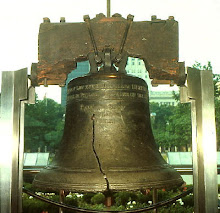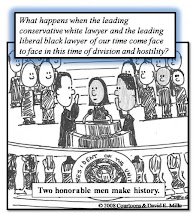
Let's begin Monday by acknowledging a few intriguing notes.
Friday, I believe, was the 46th anniversary of Gideon v. Wainwright, the Supreme Court's 1963 decision holding that states have a constitutional obligation to provide court-appointed lawyers for indigent criminal defendants. Charged with breaking and entering into a Panama City, Florida, pool hall, Clarence Earl Gideon Gideon, was denied his request that an attorney be appointed to represent him. The Supreme Court reversed his conviction, holding that defense counsel is "fundamental and essential" to a fair trial.
"In our adversary system of criminal justice, any person haled into court, who is too poor to hire a lawyer, cannot be assured a fair trial unless counsel is provided for him," Justice Hugo L. Black wrote for the court. "This seems to us to be an obvious truth."
That said, private lawyers who take court-appointed cases in the federal system just got a pay raise. Last week, James C. Duff, director of the Administrative Office of the United States Courts, issued a memorandum directing the federal courts to increase the hourly rates and case maximums.
As of March 11, blogger Robert Ambrogi reports, the hourly rate for non-capital cases went from $100 to $110. For capital cases, the hourly rate went from $170 to $175. The maximum that a lawyer can bill for a case went from $7,800 for a felony trial to $8,600 and from $2,200 for a misdemeanor trial to $2,400. The maximum for a felony appeal is now $6,100, up from $5,600, and for a misdemeanor appeal $6,100, up from $5,600. The federal Office of Defender Services has detailed information about the new rates and maximums.
Here's the case that made history:
































No comments:
Post a Comment